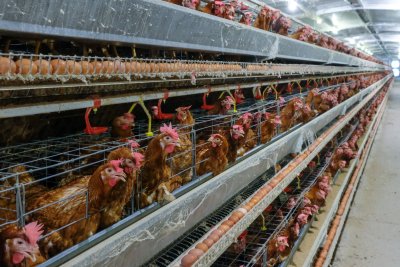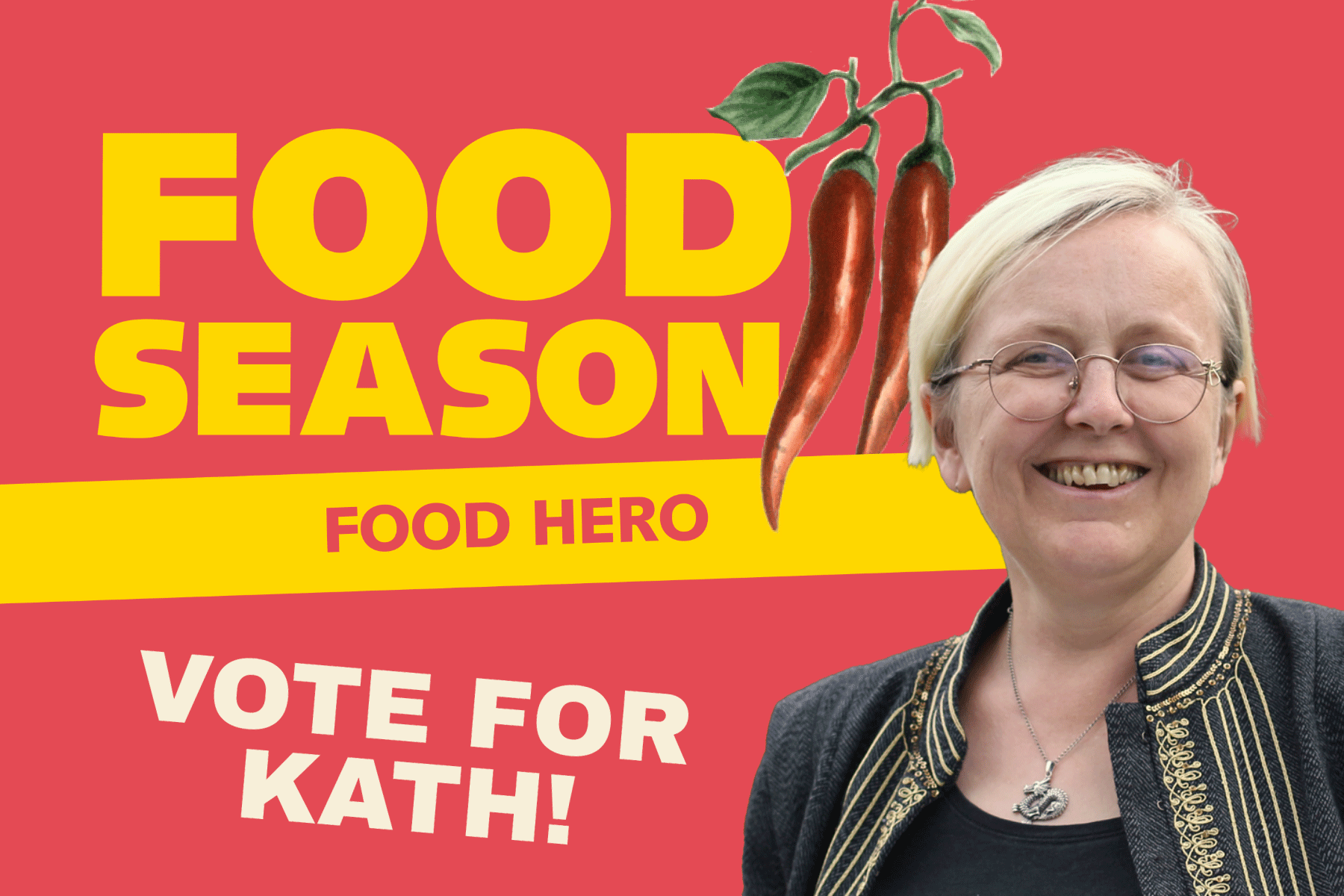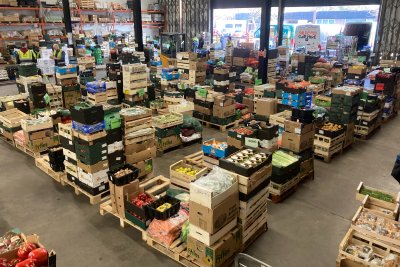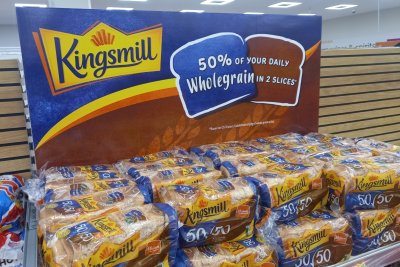“We are going to have to face down those people who say they do not want to see further production facilities. Because we need to feed our country”. Lily O'Mara addresses recent words from Minister Daniel Zeichner, and breaks down the cost and impact of intensive livestock farming.
These were the fighting words of Daniel Zeichner, Minister of State for Food Security and Rural Affairs as he addressed the egg and poultry industry in south Wales last month.
Having worked with exactly the people the minister thinks it's necessery to ‘face down’, I’d like to outline how disastrous the ongoing increase in livestock facilities in the UK is. Even more expansion risks further dividing farming communities, makes a mockery of promises to reduce climate emissions and river pollution, offers no tangible or equitable solution for farmers, and is deeply flawed as a solution to food security.
Instead of capitulating to agri-giants (the event sponsors Avara, Cargill, Noble Foods and Moy Park must have silently cheered at his words), we need farming policies that will benefit the environment and rural communities, and improve conditions for workers across the food system. And we need communities and planners to be empowered to protect themselves and the environment.
Factory farming and the food security myth
The suggestion that factory farms are essential to feed the country is a harmful fallacy. If groups like the NFU and companies like Avara and Cargill pressure the government to uphold this narrative, we must firmly rebut them. The UK's latest food security report highlights climate change, farming intensification, and increased meat consumption as threats to food availability and affordability:
The environmental effects of expanding livestock production remain a risk in a context of feeding a growing population and maintaining global food security. (p48)
Is factory farming really using hardly any land?
Mr Zeichner told the conference that – in the context of egg and poultry meat – consumers expected food to be “cheap, they want it to be produced to the highest standards, they want more and they don’t want to allow any land to be given over to do it.”
Intensive animal farming may use less space locally but has a massive overseas land footprint and is an incredibly inefficient way to produce protein. In the UK, over half our wheat, barley, and oats, and 58% of croppable land, go to animal feed instead of feeding humans directly. Additionally, the UK imports large amounts of grain and soy for this purpose. This is perpetuating systems of power, control, and environemtnal destruction overseas, and thus upholding colonialist practices.
We must treat the overseas impacts of our policies as just as important as those on our doorstep. As part of this we must act in solidarity with overseas communities by supporting sustainable farming and diets that reduce reliance on imported feed.
Climate change and river pollution risk from more livestock production
The government has pledged many times to tackle river pollution, yet intensive agriculture remains the leading cause in England and Wales. Factory farms produce enormous volumes of waste in a small area, can result in runoff into rivers. The UK’s most polluted rivers are already surrounded by clusters of these units. On climate change, in November the UK committeed to an 81% reduction in greenhouse gas emissions by 2050. With livestock such a collossal emitter, the Climate Change Committee recommends a 20-50% reduction in meat consumption to meat climate targets. How will the minister meet legally binding environmental targets if more such units are built?
Is ‘cheap food’ worth the price?
In a climate, nature and health emergency, we need to challenge why high-emissions and unhealthy food is so ubiquitous, while healthy and sustainable diets are out of reach for so many people. This is a political choice, and government policy can change it. For example, we can enable the money in the food system to be shared equitably rather than being raked in by agribusinesses at the expense of everyone else. This is not an ideological pipe dream - the Bridging the Gap project for example is making organic veg and pulses accessible to school children on low incomes, and paying a fair price across the supply chain. Diverting the estimated £269 million received by factory farming in subsidies to such schemes would be a great start. We also need to consider the toll that consolidation and intensification is having on our farming communities. Factory farming is estimated to have cost 14,000 farming jobs in the UK and pays farmers miserably. We must resist this direction of travel.
The power of planning
The Minister isn’t wrong - there is real power in the planning system. Strong local planning policies can support small-scale, climate and nature-friendly farming and enterprises like farm shops, glasshouses, peri-urban farms, markets and small processing facilities. Such farming systems benefit wildlife, create jobs, and helping build sustainable rural economies. At the same time, policies, local plans and council committees can act as a critical check on climate damaging and polluting developments. Factory farms produce eye-watering levels of greenhouse gas emissions, and treat animals in ways that should horrify anyone who takes a closer look. Shouldn’t local democracy be strengthened?
Agribusinesses accused of concealing environmental impacts
Our work with exactly the local communities the minister said he wants to ‘face down’ has uncovered alarming behaviour that should make our leaders question entrusting our countryside to these corporations. They are producing plans that are worryingly thin on detail about likely environmental harms, especially the extent and magnitude of greenhouse gas impacts and where waste will end up. In one high-profile case in Methwold, Norfolk, an application for one of the largest mega-farms is Europe does not contain a climate impact assessment, which is likely not to be compliant with environmental protection law.
More power to local communities!
The new Labour government’s promise of greater devolved powers to regions in England is a welcome development, if it gives more control to communities most affected by these disastrous developments. Communities must have the tools and democratic mechanisms to reject factory farms and promote sustainable alternatives. At a bare minimum, we need to follow the recommendations of the environmental audit committee and halt the spread of these units in polluted catchments. If we’re serious about tackling climate change and ensuring food security, we must phase out all intensive livestock farming and move toward a just transition to agroecological food systems.
As worried as we are? Here’s what you can do
If you’re concerned about the spread of factory farms and the damage they cause, you’re not alone. The good news is, there’s plenty you can do.
-
Check out the Planning for the Planet campaign – it contains resources to help develop progressive local planning policies
-
Look up what’s happening in your area
These developments often fly under the radar, hidden in your local council’s planning portal. Take a moment to check your council’s website to see if there are any new applications for factory farms. If you spot one, you can object, rally your community, and make some noise.
-
Speak out on the Methwold mega farm
Methwold could set a dangerous precedent for factory farming in the UK. Have your say by responding to the consultation—it’s a chance to make your voice heard on one of the biggest factory farm proposals in Europe. Keep an eye on updates from Food for the Planet, WWF, and Feedback, who are joining local communities on leading the charge.
-
Get your local representatives on board
Write to your councillors and MPs. Let them know you don’t want factory farms in your community—or anyone else’s. Share resources from campaigns like Planning for the Planet to show them there are better ways to support farming and food security.
-
Support a fairer food system
Every time you choose to support small-scale, local, and sustainable farms, you’re helping build a food system that works better for people and the planet.
And keep up to date with me, I’ll be working on this issue as part of a social justice fellowship with the Bertha Foundation for the next year. You can follow me on LinkedIn.
There's more about the harms from factory farming in my colleague Sam’s blog, as well as our exposé on the extortionate profits being made by agribusinesses, and you can see if you are in a factory farming hotspot.
Layer chickens in multilevel conveyor production line of chicken eggs. Copyright: Mai.Chayakorn | shutterstock
Food for the Planet: Helping local authorities to tackle the climate and nature emergency through food.









